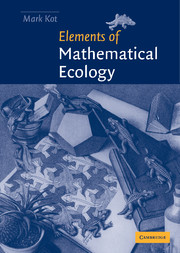Book contents
- Frontmatter
- Contents
- Preface
- Acknowledgments
- I UNSTRUCTURED POPULATION MODELS
- 1 Exponential, logistic, and Gompertz growth
- 2 Harvest models: bifurcations and breakpoints
- 3 Stochastic birth and death processes
- 4 Discrete-time models
- 5 Delay models
- 6 Branching processes
- 7 A classical predator-prey model
- 8 To cycle or not to cycle
- 9 Global bifurcations in predator–prey models
- 10 Chemostat models
- 11 Discrete-time predator–prey models
- 12 Competition models
- 13 Mutualism models
- 14 Harvest models and optimal control theory
- II STRUCTURED POPULATION MODELS
- References
- Author index
- Subject index
13 - Mutualism models
Published online by Cambridge University Press: 05 August 2012
- Frontmatter
- Contents
- Preface
- Acknowledgments
- I UNSTRUCTURED POPULATION MODELS
- 1 Exponential, logistic, and Gompertz growth
- 2 Harvest models: bifurcations and breakpoints
- 3 Stochastic birth and death processes
- 4 Discrete-time models
- 5 Delay models
- 6 Branching processes
- 7 A classical predator-prey model
- 8 To cycle or not to cycle
- 9 Global bifurcations in predator–prey models
- 10 Chemostat models
- 11 Discrete-time predator–prey models
- 12 Competition models
- 13 Mutualism models
- 14 Harvest models and optimal control theory
- II STRUCTURED POPULATION MODELS
- References
- Author index
- Subject index
Summary
Mutualism is an interaction in which species help one another. Mutualism has seldom received the attention of predation and competition. This neglect is quite surprising, given the ubiquity of mutualisms.
Janzen (1985), in a thorough review of the natural history of mutualisms, has argued that most mutualisms can be classified into one of four types: seed-dispersal mutualisms, pollination mutualisms, digestive mutualisms, and protection mutualisms. Let me give you a few examples of each type of mutualism.
Seed-dispersal mutualisms
A great many plants rely on animals to carry their seeds to favorable sites. Plants frequently produce fruits and nuts to attract and reward dispersal agents. Squirrels are undoubtedly the most familiar mammalian dispersal agents. Tree squirrels collect and eat acorns, walnuts, beechnuts and other nuts (Smith and Follmer, 1972; Stapanian and Smith, 1978). At times they will bury or cache seeds and then lose or forget them. It is this last bit of forgetfulness that makes the squirrel a mutualist of the adult tree.
I am an avid birdwatcher, so most of my favorite examples of seeddispersal mutualism involve birds. In western North America, there is an extremely tight correspondence between the ranges of wingless-seeded soft pines such as white-bark pine (Pinus albicaulis), limber pine (Pinus flexilis), southwestern white pine (Pinus strobiformis), Colorado pinyon (Pinus edulis), and singleleaf pinyon (Pinus monophylla) and the ranges of corvids such as Clark's Nutcracker (Nucifraga Columbiana), Pinyon Jay (Gymnorhinus cyanocephalus), Western Scrub Jay (Aphelocoma californica), and Stellar's Jay (Cyanocitta stelleri) (Lanner, 1996). The aforementioned trees have wingless seeds that sit within a cone.
- Type
- Chapter
- Information
- Elements of Mathematical Ecology , pp. 220 - 236Publisher: Cambridge University PressPrint publication year: 2001



